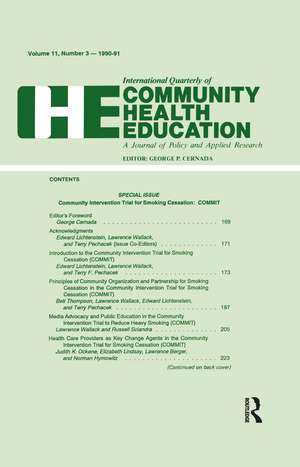Community Intervention Trial for Smoking Cessation: COMMIT
Autor Edward Lichtenstein, Lawrence Wallack, Terry Pechaceken Limba Engleză Paperback – 15 iun 1991
| Toate formatele și edițiile | Preț | Express |
|---|---|---|
| Paperback (1) | 278.34 lei 6-8 săpt. | |
| Taylor & Francis – 15 iun 1991 | 278.34 lei 6-8 săpt. | |
| Hardback (1) | 1058.85 lei 6-8 săpt. | |
| Taylor & Francis – 2 oct 2019 | 1058.85 lei 6-8 săpt. |
Preț: 278.34 lei
Preț vechi: 311.41 lei
-11% Nou
Puncte Express: 418
Preț estimativ în valută:
53.26€ • 55.61$ • 44.08£
53.26€ • 55.61$ • 44.08£
Carte tipărită la comandă
Livrare economică 04-18 aprilie
Preluare comenzi: 021 569.72.76
Specificații
ISBN-13: 9780895031556
ISBN-10: 0895031558
Pagini: 140
Dimensiuni: 152 x 229 mm
Greutate: 0.45 kg
Ediția:1
Editura: Taylor & Francis
Colecția Routledge
Locul publicării:Oxford, United Kingdom
ISBN-10: 0895031558
Pagini: 140
Dimensiuni: 152 x 229 mm
Greutate: 0.45 kg
Ediția:1
Editura: Taylor & Francis
Colecția Routledge
Locul publicării:Oxford, United Kingdom
Public țintă
Professional Practice & DevelopmentCuprins
Editor’s Foreword -- Introduction to the Community Intervention Trial for Smoking Cessation (Commit) -- Principles of Community Organization and Partnership for Smoking Cessation in the Community Intervention Trial for Smoking Cessation (Commit) -- Media Advocacy and Public Education in the Community Intervention Trial to Reduce Heavy Smoking (Commit) -- Health Care Providers as Key Change Agents in the Community Intervention Trial for Smoking Cessation (Commit) -- Promoting Smoking Control Through Worksites in the Community Intervention Trial for Smoking Cessation (COMMIT) -- Enhancing Resources for Smoking Cessation Through Community Intervention: Commit as a Prototype -- Evaluation Plan for the Community Intervention Trial For Smoking Cessation (Commit) -- Process Evaluation in the Community Intervention Trial for Smoking Cessation (Commit)
Notă biografică
Edward Lictenstein, Lawrence Wallack, Terry Pechacek
Descriere
This book emphasizes the importance of community mobilization, ownership and partnership in educational intervention as well as the difficulties of balancing standardized research protocols against the need to design interventions suitable to a particular and often community setting.
